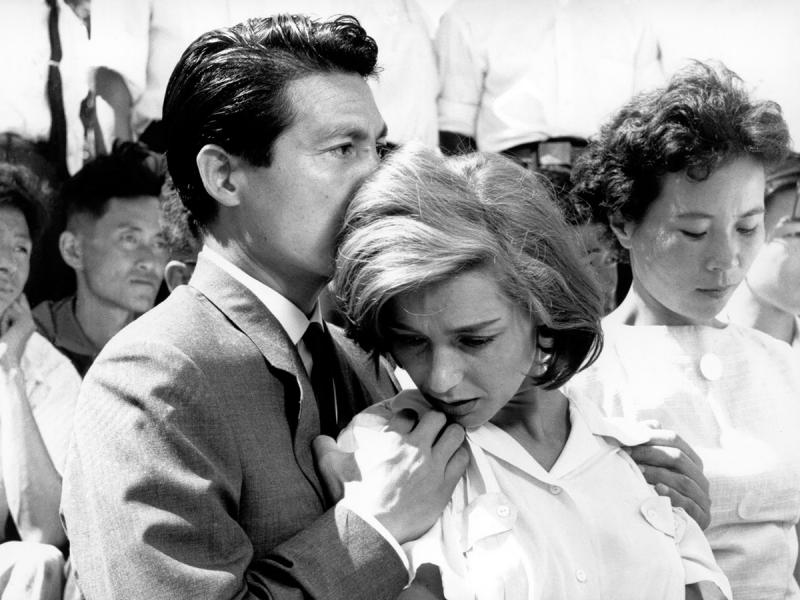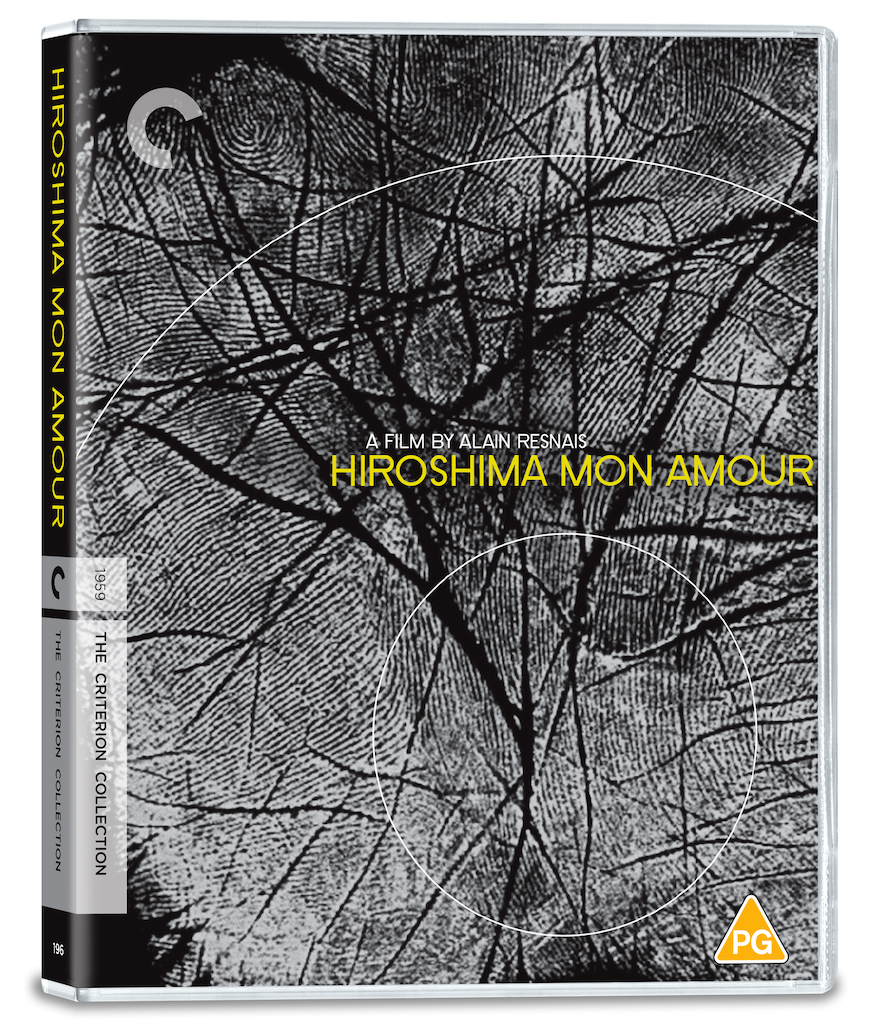Blu-ray: Hiroshima mon amour | reviews, news & interviews
Blu-ray: Hiroshima mon amour
Blu-ray: Hiroshima mon amour
Alain Resnais' masterpiece about unspeakable memories of World War II

Hiroshima mon amour (1959), Alain Resnais’s first feature-length film, followed a number of remarkable short documentaries, the most famous of which was Nuit et brouillard (Night and Fog, 1956), a haunting evocation of Nazi terror, and still a reference for the way in which the unspeakable can be powerfully expressed.
Another was Toute la mémoire du monde (1956), a beautiful work about the Bibliothèque Nationale, France’s national library – a film about memory, compressed into thousands of book stacks through which Resnais’ camera tracked relentlessly. The same tracking shots re-appear in Hiroshima mon amour, another film in which memory plays an important part. The film juxtaposes the Japanese city’s traumatic recollection of death and destruction with a French woman’s recollection of a tragic love affair with an enemy soldier in WW2 provincial France – and her subsequent humiliation after the liberation.
Resnais was originally commissioned to make a film about the atomic bomb, but he felt (as he explains in an interview included as an extra here) unable to do this in a way that spoke truth to the catastrophic inhumanity of the Hiroshima and Nagasaki bombings. He ended up collaborating with the writer Marguerite Duras, who produced a non-linear script with very poetic dialogues and voice-overs that make for a film that is both experimental and accessible.

This lyrical work swings, at times gently and at others more violently, between Hiroshima and Nevers, the place names spoken repeatedly by the lovers as if they were mantras or invocations. The French woman, played by the young Emmanuelle Riva with an exquisitely emotional touch, meets a young Japanese man (Eiji Okada) who falls desperately in love with her.
The film takes place over two nights in Hiroshima – one in which, beautifully lit and shot in close-up, they make passionate love. On the other night, as they wander around an oneiric city that has only just risen from the ashes, the woman recounts the fated story of her first love during the Nazi occupation. This is a film about impossible loves and about the possibility of love in a time of war. It reflects the claustrophobia of the nuclear age and the Cold War.
The film was beautifully restored in 2013, and the black-and-white aesthetic works wonderfully: the sleepy provincial French town of Nevers a picture of urban decay contrasted with the neon-lit cityscape of post-war Japan. As can be expected from a Criterion release, the bonuses are a treat: two good interviews each with Resnais and Riva. There is also a good account of the film’s genesis and making by François Thomas.
Although Resnais is often thought of as part of the French New Wave, he is only so in terms of constant experiment. Otherwise he is very much himself, difficult to link with Godard, Truffaut, Chabrol, Jean Eustache, or Louis Malle. His oeuvre has yet to be fully appreciated
rating
Explore topics
Share this article
The future of Arts Journalism
You can stop theartsdesk.com closing!
We urgently need financing to survive. Our fundraising drive has thus far raised £49,000 but we need to reach £100,000 or we will be forced to close. Please contribute here: https://gofund.me/c3f6033d
And if you can forward this information to anyone who might assist, we’d be grateful.

Subscribe to theartsdesk.com
Thank you for continuing to read our work on theartsdesk.com. For unlimited access to every article in its entirety, including our archive of more than 15,000 pieces, we're asking for £5 per month or £40 per year. We feel it's a very good deal, and hope you do too.
To take a subscription now simply click here.
And if you're looking for that extra gift for a friend or family member, why not treat them to a theartsdesk.com gift subscription?
more Film
 Blu-ray: Finis Terrae
Bleak but compelling semi-documentary, filmed on location in Brittany
Blu-ray: Finis Terrae
Bleak but compelling semi-documentary, filmed on location in Brittany
 Oslo Stories Trilogy: Sex review - sexual identity slips, hurts and heals
A quietly visionary series concludes with two chimney sweeps' awkward sexual liberation
Oslo Stories Trilogy: Sex review - sexual identity slips, hurts and heals
A quietly visionary series concludes with two chimney sweeps' awkward sexual liberation
 Sorry, Baby review - the healing power of friendship in the aftermath of sexual assault
Eva Victor writes, directs and stars in their endearing debut feature
Sorry, Baby review - the healing power of friendship in the aftermath of sexual assault
Eva Victor writes, directs and stars in their endearing debut feature
 Blu-ray: Who Wants to Kill Jessie?
Fast-paced and visually inventive Czech comedy
Blu-ray: Who Wants to Kill Jessie?
Fast-paced and visually inventive Czech comedy
 Oslo Stories Trilogy: Love review - freed love
Gay cruising offers straight female lessons in a heady ode to urban connection
Oslo Stories Trilogy: Love review - freed love
Gay cruising offers straight female lessons in a heady ode to urban connection
 Beating Hearts review - kiss kiss, slam slam
Romance and clobberings in a so-so French melodrama
Beating Hearts review - kiss kiss, slam slam
Romance and clobberings in a so-so French melodrama
 Materialists review - a misfiring romcom or an undercooked satire?
Writer-director Celine Song's latest can't decide what kind of film it is
Materialists review - a misfiring romcom or an undercooked satire?
Writer-director Celine Song's latest can't decide what kind of film it is
 theartsdesk Q&A: actor Leonie Benesch on playing an overburdened nurse in the Swiss drama 'Late Shift'
The Guildhall-trained German star talks about the enormous pressures placed on nurses and her admiration for British films and TV
theartsdesk Q&A: actor Leonie Benesch on playing an overburdened nurse in the Swiss drama 'Late Shift'
The Guildhall-trained German star talks about the enormous pressures placed on nurses and her admiration for British films and TV
 Freakier Friday review - body-swapping gone ballistic
Lindsay Lohan and Jamie Lee Curtis's comedy sequel jumbles up more than their daughter-mother duo
Freakier Friday review - body-swapping gone ballistic
Lindsay Lohan and Jamie Lee Curtis's comedy sequel jumbles up more than their daughter-mother duo
 Eight Postcards from Utopia review - ads from the era when 1990s Romania embraced capitalism
Radu Jude's documentary is a mad montage of cheesy TV commercials
Eight Postcards from Utopia review - ads from the era when 1990s Romania embraced capitalism
Radu Jude's documentary is a mad montage of cheesy TV commercials
 The Kingdom review - coming of age as the body count rises
A teen belatedly bonds with her mysterious dad in an unflinching Corsican mob drama
The Kingdom review - coming of age as the body count rises
A teen belatedly bonds with her mysterious dad in an unflinching Corsican mob drama

Add comment